Key takeaways:
- Brand storytelling fosters emotional connections, enabling audiences to resonate personally with the music and artists.
- Key elements of effective storytelling include authenticity, relatability, and a compelling narrative arc that captivates listeners.
- Creating a unique band narrative involves exploring personal experiences and cultural backgrounds that make the music relatable.
- Engaging audiences emotionally enhances the shared experience, utilizing storytelling and visuals to deepen connections.
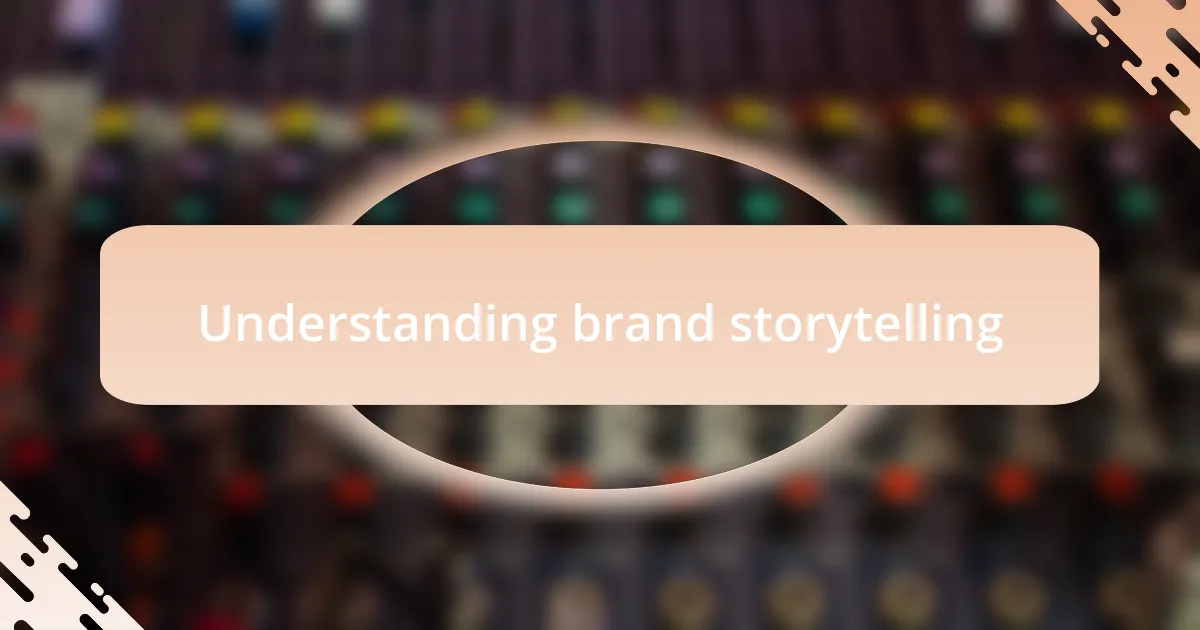
Understanding brand storytelling
Brand storytelling is more than just a marketing tool; it’s a way to connect deeply with your audience. I remember the first time I heard a band’s backstory – how their struggles inspired their music. That personal touch made me not just a listener, but a devoted fan. Isn’t it powerful how a story can transform our perception of the music?
When I reflect on my experiences, I realize that effective brand storytelling evokes emotions that resonate with the audience. For example, think about a favorite song that you associate with a particular time in your life. That connection often stems from the story the artist shared. Why else do some songs feel like they were written just for us? It’s that emotional bridge that great storytelling builds, leading us to invest our time and energy into the brand.
Moreover, brand storytelling allows artists to stand out in a crowded market. In an industry flooded with talent, a unique narrative can be the key differentiator. I once attended a concert where the lead singer shared tales of their journey, struggles, and triumphs. That authenticity made all the difference; it turned their performance into a memorable experience. How often do we choose to support brands that resonate with our personal stories and experiences? It’s the shared journey that binds us together.
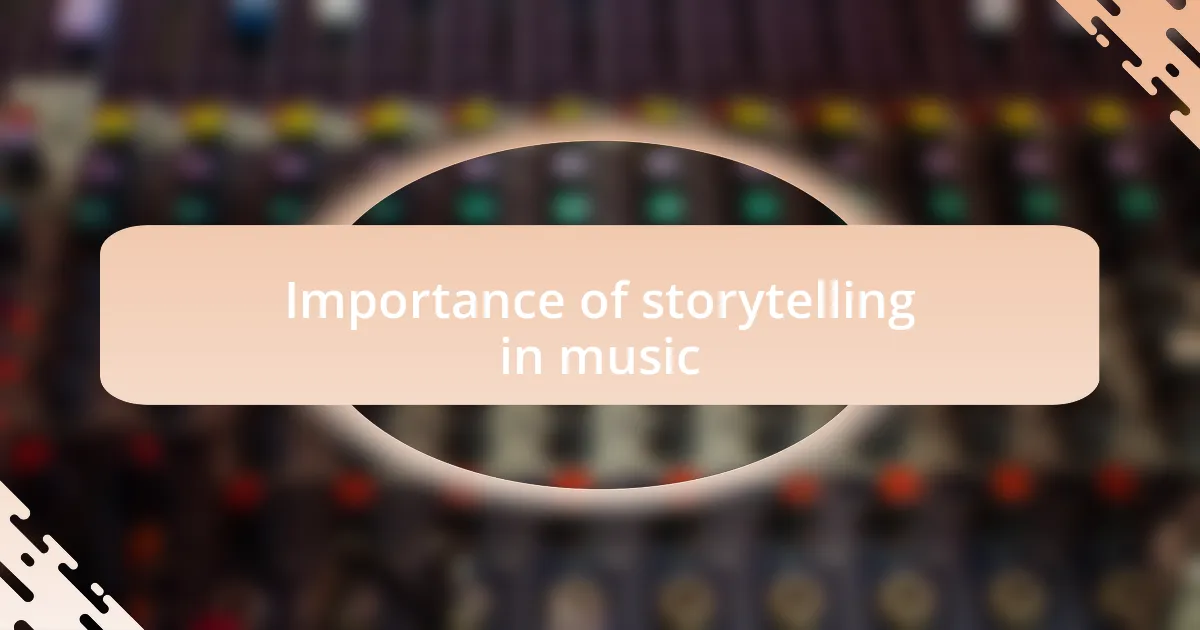
Importance of storytelling in music
Stories in music serve as bridges that connect artists with their audience. When I hear a song that tells a story, it draws me in; I not only listen to the melody but also experience the journey with the artist. It reminds me of a time when I found solace in a song that detailed heartbreak, offering me not just comfort but a sense of understanding. How often do we find ourselves attached to music because it reflects our own life experiences?
The narratives woven into songs create a sense of belonging among fans. I remember when a local band shared their story of perseverance during tough times, and suddenly, their lyrics resonated with my own struggles. It felt as if they were speaking directly to me, validating my experiences. Isn’t it interesting how a mesh of lyrics and backstory can transform a concert into a communal experience?
Moreover, storytelling in music can be a powerful marketing tool. When bands creatively share their stories, they can capture attention in a world bombarded with choices. I once discovered an unsigned artist through a heartfelt video documenting their journey, and I felt an immediate urge to support their work. This tactic not only cultivated a loyal fan base but also showcased the musician’s authenticity. Do you remember when a band’s story made you want to follow their journey?
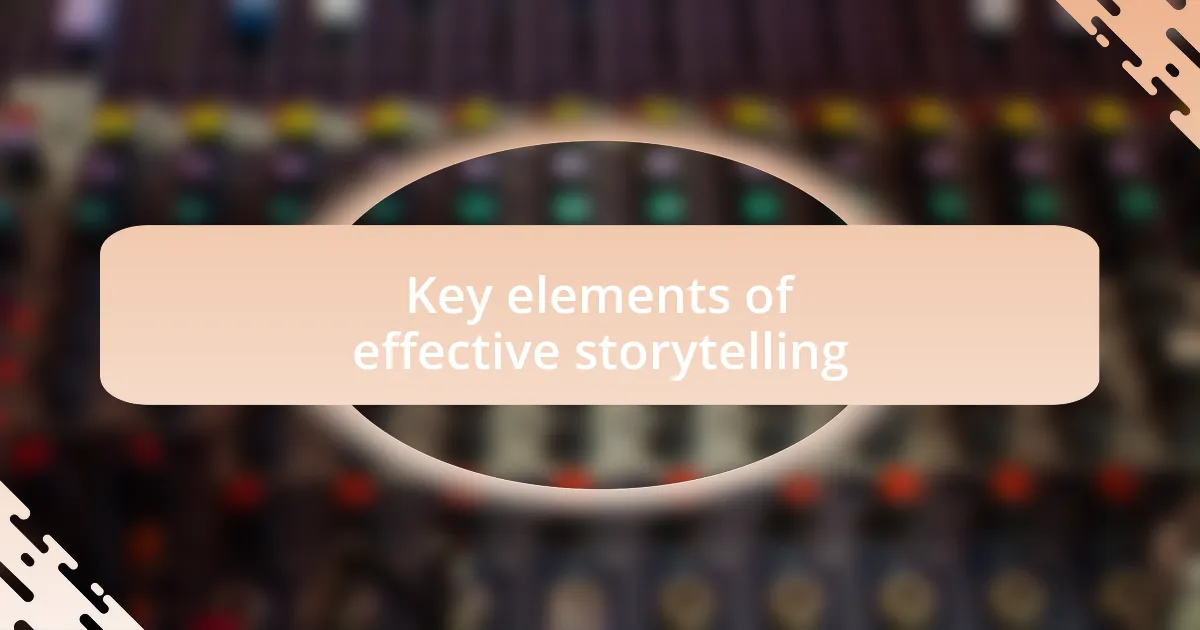
Key elements of effective storytelling
Effective storytelling often hinges on authenticity. When I listen to a band share their true experiences, I can feel their passion and sincerity. For instance, a friend of mine started a music project detailing his struggles with mental health through his lyrics. The raw honesty in his storytelling created deeper connections with listeners, drawing them into a shared experience. Isn’t it this genuine connection that often keeps us hooked?
Another key element is relatability. I remember discovering a song about overcoming fear and self-doubt just when I was navigating a tough phase in my own life. The artist’s ability to articulate that struggle made their music not just enjoyable but also meaningful. This relatability transforms the music from mere entertainment into an emotional lifeline, don’t you think?
Finally, a compelling narrative arc is vital for engaging storytelling. A well-structured story has a beginning, middle, and end, guiding listeners through an emotional journey. I once attended a concert where the band played songs in chronological order, narrating their evolution as musicians and individuals. I found myself captivated by how their stories interwove with the music, creating a powerful shared experience. What elements do you think artists need to master to ensure their stories resonate deeply?

Creating a unique band narrative
When creating a unique band narrative, it’s crucial to dig deep into the band’s roots. I often find that the most compelling stories come from personal experiences and cultural backgrounds. For instance, a band I admire shared how their hometown’s struggles influenced their sound and lyrical themes. This connection made their music more relatable, drawing me in. Have you ever connected with an artist because their story mirrored your own experiences?
Another important aspect is the uniqueness of your voice. I remember hearing a band that incorporated elements from their diverse heritage into their music and storytelling. Their songs felt fresh yet familiar, and I found myself captivated. It reminded me that storytelling in music isn’t just about the message but how you convey it. How can your band’s unique identity shape the narrative you want to share?
Ultimately, a great band narrative embodies evolution. I’ve seen bands transform over time, with their stories reflecting personal growth and change. One band I followed started with carefree party anthems but evolved to tackle more serious themes as they matured. That journey not only made their music richer but also resonated with listeners who were experiencing similar life changes. Isn’t it fascinating how our stories can evolve and connect us through different stages of life?
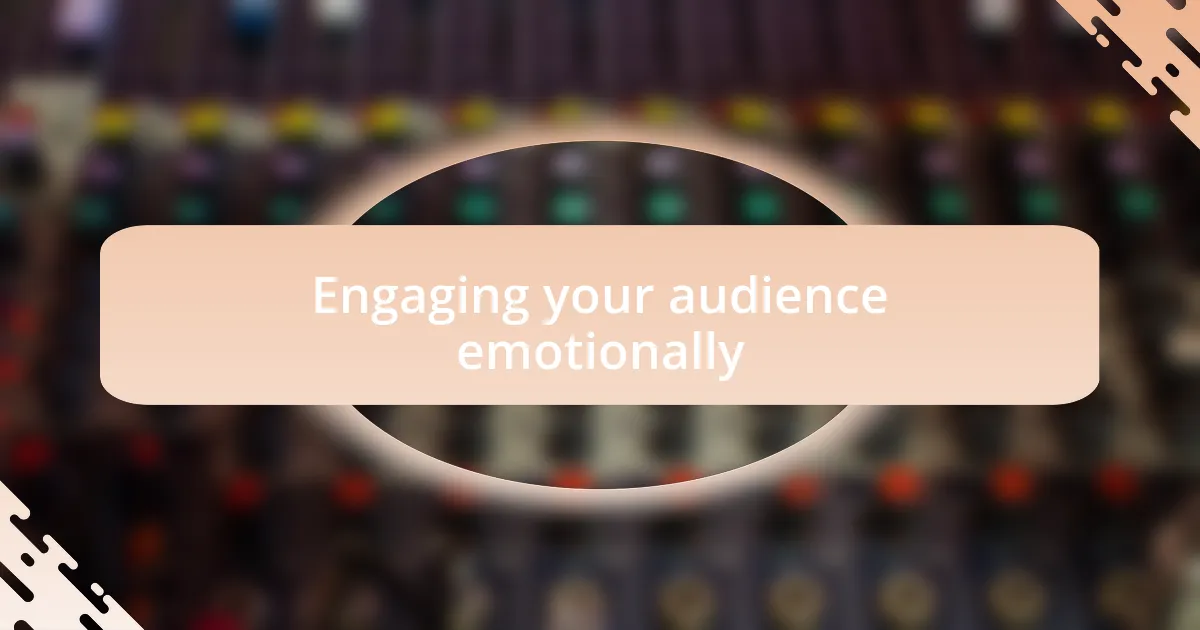
Engaging your audience emotionally
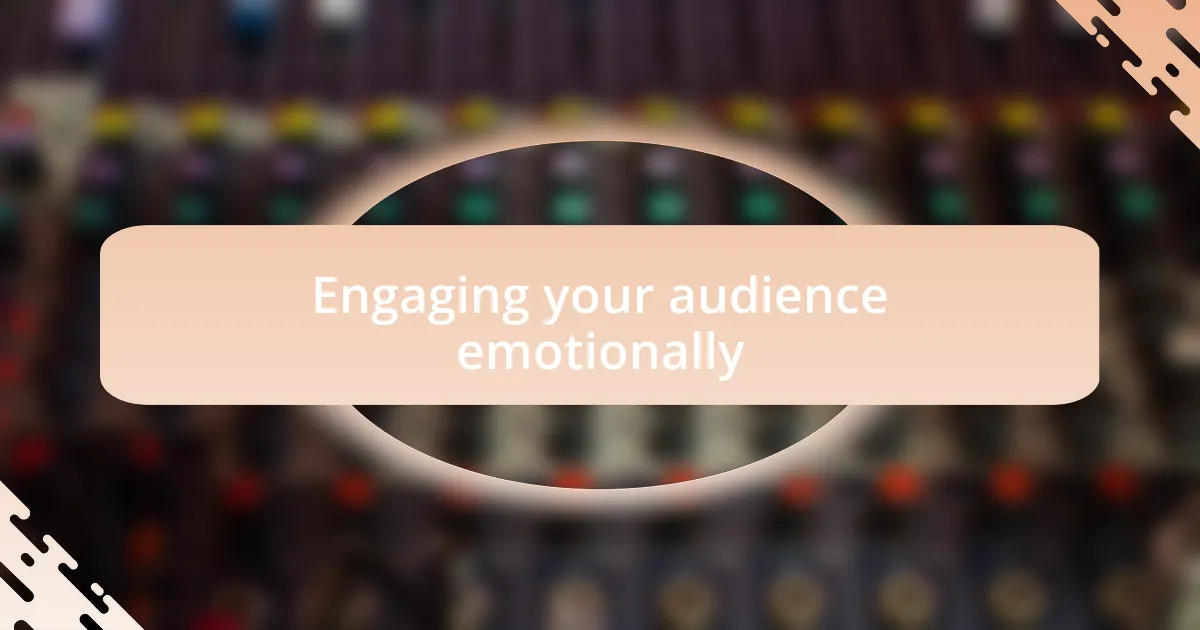
Engaging your audience emotionally
Engaging your audience emotionally is about weaving stories that resonate on a deeply personal level. I remember attending a concert where the lead singer shared a heartfelt story about overcoming loss. That moment transformed the entire atmosphere, unifying everyone in the room through shared vulnerability. Have you ever felt a wave of emotion wash over you because an artist’s story mirrored your own pain or joy? It’s powerful how a single narrative can create such a strong bond between the performer and the audience.
Another effective approach is to use visuals that complement your narrative. I once watched a music video that intertwined animation with a band’s story about chasing dreams and facing obstacles. The imagery was captivating and enhanced the emotional punch of their lyrics. I found myself reflecting on my own journey, which made the song linger in my mind long after it ended. How can you use visuals to elevate your band’s tale and ensure it strikes a chord with your fans?
Finally, authenticity plays a critical role in emotional engagement. I’ve seen bands be transparent about their struggles—whether it be mental health or personal relationships—which has made me connect with them on a new level. Their honesty allows me to feel like a part of their journey, not just a spectator. It makes me wonder, isn’t it our collective experiences and honest storytelling that make music so relatable and profound?
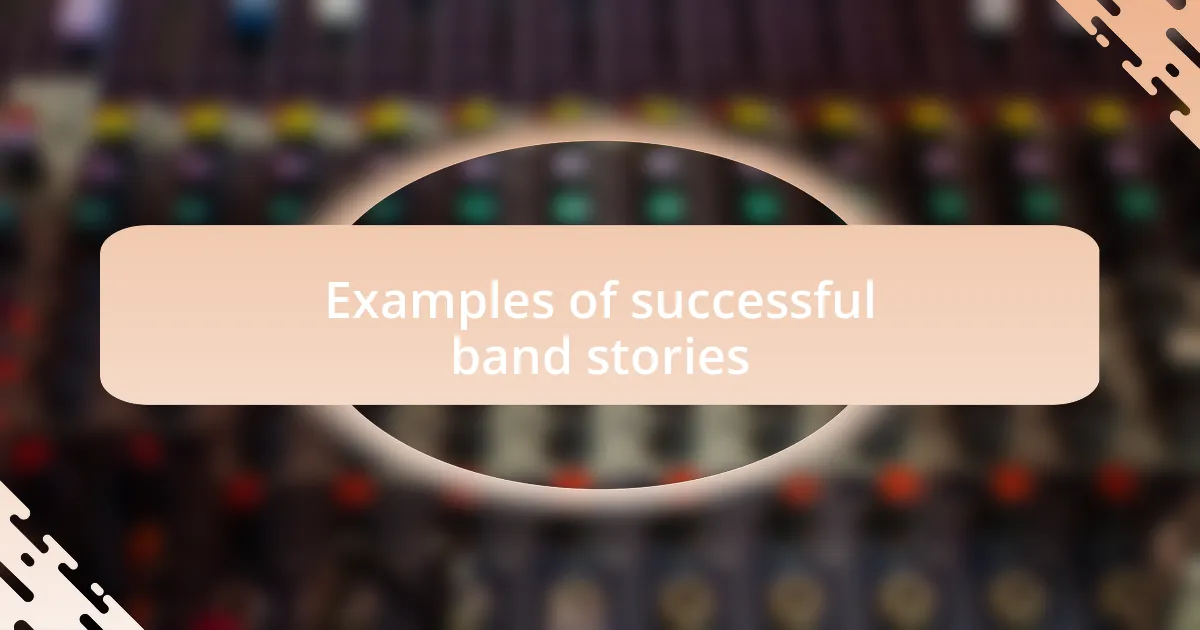
Examples of successful band stories
One remarkable example of successful band storytelling is found in the journey of The Lumineers. I recall my first encounter with their song “Ho Hey,” which was paired with tales of struggles and intimacy during their live performances. The lead singer spoke about their experiences while trying to make it in the music industry, evoking a sense of camaraderie. It made me wonder—how many other fans felt that same sense of perseverance echoed in their own lives?
Then there’s the legendary band Queen, whose story of resilience and reinvention captivates fans even today. When I watched their biopic “Bohemian Rhapsody,” I was struck not just by the incredible music but by how their trials and triumphs were told. Freddie Mercury’s journey of self-acceptance resonated with me deeply. Haven’t we all faced moments where we had to embrace our true selves against the odds?
Another example that stands out is the indie band Hozier. I remember attending a small venue where he shared the backstory behind “Take Me to Church,” discussing his critique of societal norms. That honesty struck a chord; it wasn’t just a song, but a commentary on love and humanity. Isn’t it fascinating how one person’s story can ignite a larger conversation?
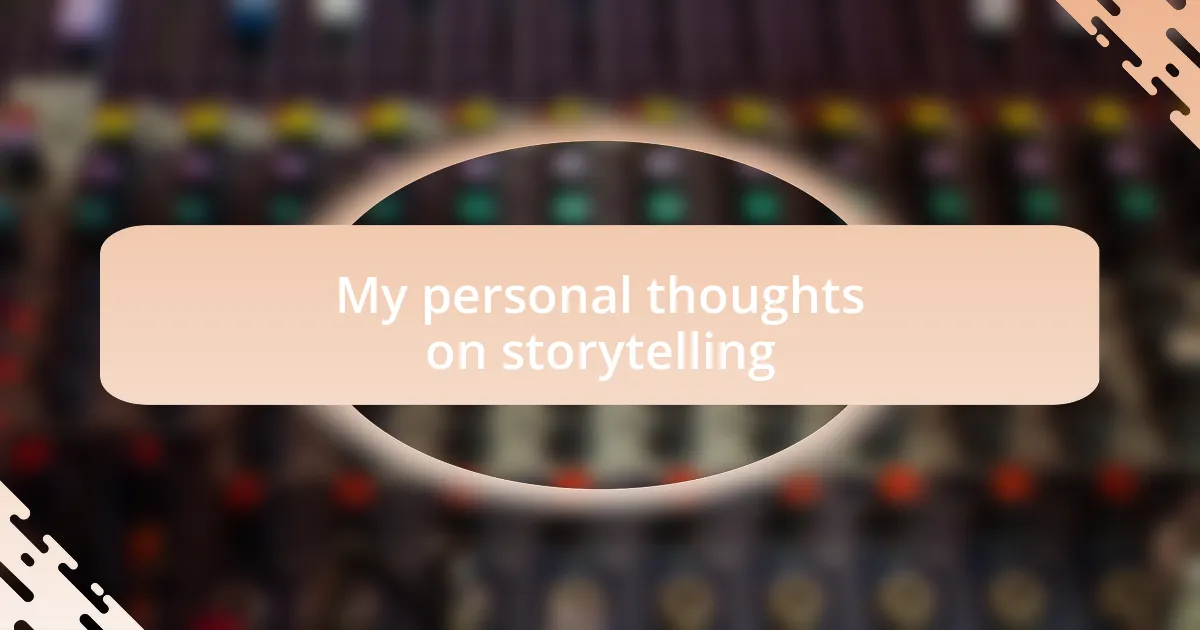
My personal thoughts on storytelling
Storytelling in music resonates deeply with me. I often think back to when I first heard about the struggles that shaped the sound of U2. Their tales of activism and faith inspired me to connect not only with their lyrics but also with the larger world. It made me ponder—how much do the artists’ experiences shape our understanding and appreciation of their music?
When I write about storytelling, I remember my excitement attending a local concert of a rising band. They shared their journey of uncertainty and hope throughout their set, leaving me feeling like I was part of something bigger. That connection sparked a realization: each song can be a piece of a larger narrative, and aren’t we all just looking for our place in those stories?
What truly strikes me about effective band storytelling is its power to evoke emotions and encourage reflection. I often ask myself whether we, as listeners, miss out on the depth behind the music when we only focus on catchy hooks. Isn’t it enriching to understand the heart and soul woven into the melodies? It reminds me that behind every note, there’s a story waiting to be uncovered, inviting us to feel a deeper connection.